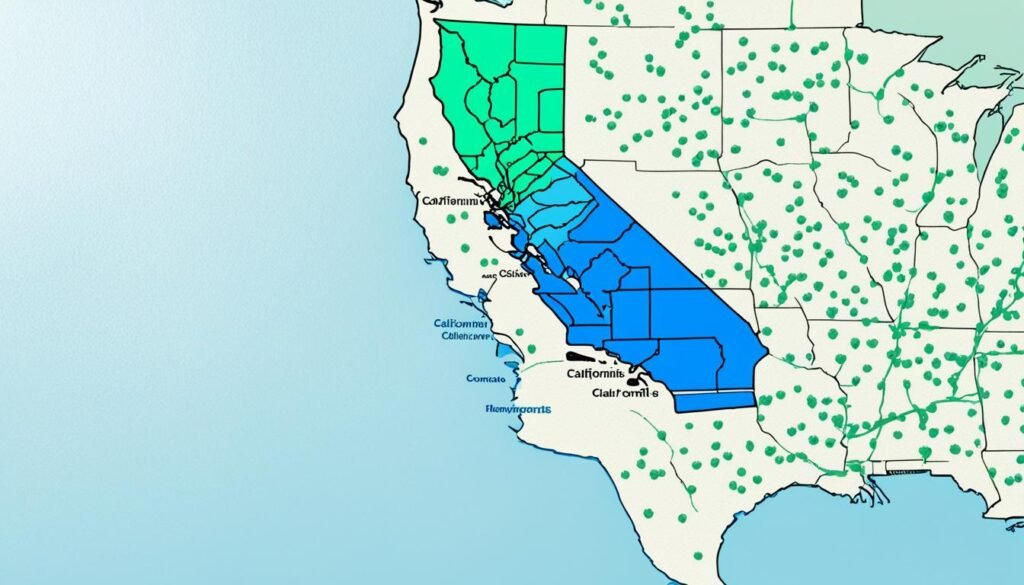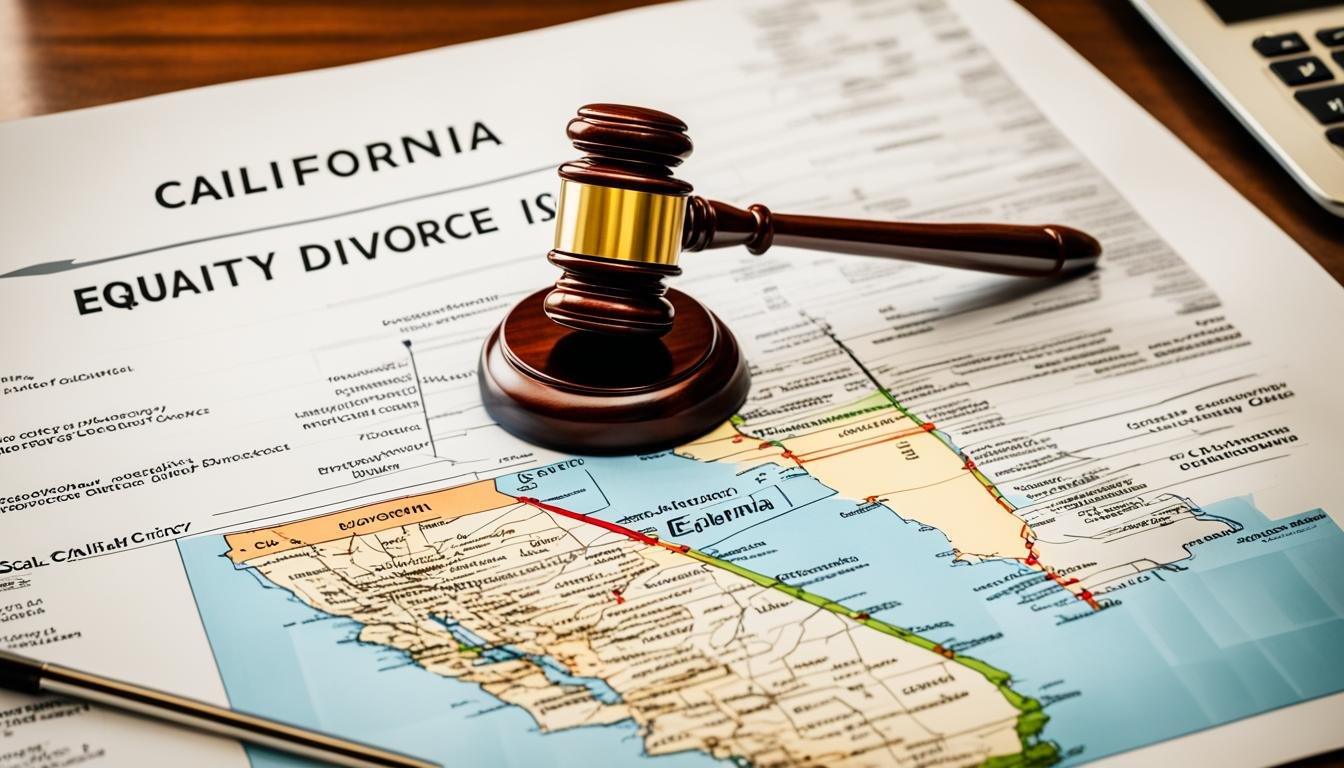If you’re thinking about getting a divorce in California, you might be surprised by recent changes in the law1. Knowing about these updates is key, whether you’re starting the process or already in it2. At Super Attorneys Of Irvine, experts offer advice and help to make the divorce process easier2.
Key Takeaways
- California has a six-month residency requirement before filing for divorce1.
- The filing spouse must have resided in the county for at least three months1.
- Uncontested divorces allow for agreed-upon terms without judicial determination1.
- Child support calculations consider the financial contributions of both parents1.
- Community property is divided equally upon divorce, while separate property is generally not subject to division12.
Understanding Residency Requirements for Filing a Divorce
To start a divorce in California, you must meet certain residency rules3. One of you must have lived in the state for at least six months before filing for divorce3. This rule is key for the California courts to handle the divorce.
Also, you must have lived in the county where you’re filing for three months3. This rule makes sure the divorce is filed in the right place, showing a strong link to the area3.
Establishing Jurisdiction Through Residency Criteria
To get a divorce in California, you or your spouse must have been in the state for 6 months and in your current county for 3 months3. This rule helps the California courts take charge of the divorce.
Dual-Layered Residency Mandate for County Filing
California also needs one spouse to have lived in the county where they’re filing for at least 3 months4. This rule makes sure the divorce is in the right local court, showing a real tie to the area.
| Residency Requirement | Duration |
|---|---|
| State Residency | 6 months |
| County Residency | 3 months |
Knowing these rules is key when filing for divorce in California. They set the stage for the courts to take action34.

“The dual-layered residency mandate ensures that the divorce is processed in an appropriate local jurisdiction, reflecting a genuine connection to the area where legal proceedings are initiated.”
Navigating the Process of Filing for Divorce
Filing for divorce in California starts with preparing and submitting the initial divorce petition. This important document states your wish to end the marriage and the terms you want5. Once you’ve lived in California for 6 months and the county for 3 months, you can file the petition with the court.
Preparing and Filing the Initial Divorce Petition
The first step is to fill out the divorce petition carefully. Make sure to include all the needed information, like your marriage details, any minor children, and how you want to split assets and debts6. After it’s complete, file it in the county where you meet the residency rules.
Serving Divorce Papers to Your Spouse
After filing, you must serve the divorce papers to your spouse6. This must be done as per California law, usually by a professional or the sheriff’s department. Your spouse then has 30 days to respond to the divorce6.
It’s key to understand the divorce filing process in California well. Knowing the steps and what you need helps you move through it smoothly and with confidence.

“The journey of divorce can be daunting, but with the right knowledge and preparation, you can navigate the process with greater ease and confidence.”
The Importance of Knowing the Difference Between Contested and Uncontested Divorce
In California, knowing the difference between contested and uncontested divorces is key. This choice affects how your case moves forward. A contested divorce means you and your ex can’t agree on things like who gets what or custody of your kids7. On the other hand, an uncontested divorce is faster and cheaper because you both agree on everything7.
Knowing if your divorce will be contested or uncontested helps you prepare for what’s next8. If you both agree on everything, you won’t need to go to court8. But if you can’t agree, you’ll likely need lawyers, more time, and court hearings to settle things8.
- Contested divorces can take a year or more because they’re complex8.
- Uncontested divorces in California usually finish in about six months after you file8.
- Choosing mediation can lead to a friendlier agreement, avoiding the harshness of court fights8.
Understanding the difference between contested and uncontested divorce in California helps you make smart choices and manage the process better7. This choice affects the cost, time, and emotional impact of your divorce.
Child Custody and Support in California Divorces
In California divorces, the well-being of children is key. Courts look at many factors to decide on child custody. They focus on what’s best for the child9. This means checking the child’s feelings towards each parent, their school and health needs, and how stable each parent can be10.
Prioritizing the Child’s Best Interests in Custody Decisions
California’s laws often prefer joint legal custody unless there’s a good reason for sole custody10. The same goes for physical custody, unless it doesn’t fit the child’s needs10. Courts try to keep the child’s life as normal as possible during the divorce.
Calculating Child Support Based on State Guidelines
For child support, California uses a strict formula. It looks at both parents’ income and how much time the child spends with each10. This way, the child’s lifestyle after the divorce stays the same, and both parents share the costs fairly9. If income or custody changes, the court can update the order9.
| Factors Considered in Child Support Calculation | Description |
|---|---|
| Number of Children | The number of children the support order covers. |
| Income of Each Parent | The gross monthly income of both parents. |
| Deductions and Hardships | Applicable deductions and financial hardships for each parent. |
| Childcare Costs | The cost of childcare for the children. |
| Time Spent with Each Parent | The amount of time the child spends with each parent. |
If someone doesn’t pay court-ordered child or spousal support, there are steps to take9. The local child support agency can help collect these payments. Or, the affected person can go to court for help if it’s just spousal support9.
“The main rule in custody decisions is the child’s welfare. Courts look at the child’s feelings towards parents, their school and health needs, and how stable each parent is.”
Understanding Property Division Laws in California
In California, when a couple gets a divorce, their property is divided by community property laws11. These laws say that any assets or debts made during the marriage must be split equally between the two people12. It’s key for those going through a divorce to understand these laws well, as they greatly affect their finances11.
Dividing Community Property and Assets Equally
California is a community property state. This means all assets and debts made during the marriage are shared by both spouses12. Each person gets a 50% share of everything that’s community property, like income, the home, bank accounts, pensions, and more12.
Distinguishing Between Community and Separate Property
Things owned by one spouse before the marriage, or gifts and inheritances during the marriage, are separate property. They don’t get divided11. California says separate property includes things bought before the marriage, gifts, and inheritances13. The goal is to make sure each person gets things of equal value, not just half of everything12.
It’s important to talk to a lawyer for complex property division cases, especially if there are valuable assets or a lot of debt11. Getting legal advice is a good idea for disputes over things like houses, businesses, big debts, prenuptial agreements, hidden debts, or retirement plans11.
| Community Property | Separate Property |
|---|---|
| Assets and debts acquired during the marriage | Assets acquired before the marriage, after separation, gifts, and inheritances |
| Includes personal income, family home, bank accounts, pensions, vehicles, business interests, and more | Not subject to division upon divorce |
| Divided equally between spouses (50/50 split) | Remains the property of the individual spouse |
Recent Changes in Divorce Law California
California’s divorce laws change often, making it key to keep up with new updates14. These changes affect things like how property is split, spousal support, and who gets custody of the kids. Talking to a divorce lawyer who knows the law can help you understand these changes and guide you through the divorce15.
One big change is how long the marriage lasted14. If a marriage lasted 10 years or more, it’s seen as long-term. This can change how property is split and if one spouse gets support14. For marriages under 10 years, support might last half as long as the marriage. But for longer marriages, support could go on without an end date14.
The 10-year rule isn’t set in stone, though. Courts might see a shorter marriage as long-term if there’s proof14. Also, how long you were married affects how community property is split, especially if one spouse earned more over time14.
Changes in child custody are another big update in divorce laws14. What’s best for the child is key, no matter the marriage length. Courts might also make one spouse pay legal fees if one was out of work for a long time14.
These are just a few updates in California’s divorce laws. It’s vital to keep up and work with a smart divorce lawyer to protect your rights and represent your interests well15.
The Role of a Divorce Lawyer in Navigating California Divorce Laws
Dealing with California divorce laws can be tough, but a divorce lawyer can help a lot16. California’s divorce laws are complex, and a good lawyer knows them well16. Many divorces here involve complex financial matters, so a skilled lawyer is crucial16. Divorce can affect your finances, property, and family for a long time, so it’s important to have a lawyer who catches all the details16.
When kids are part of a divorce in California, a lawyer is key in fighting for your rights and making custody plans that work for the kids16. California lawyers often aim for peaceful settlements outside court to lessen stress and speed up the process16. They make sure spousal support or alimony is fair, looking at things like income, how long you were married, and what each person contributed16.
In California, you can get a divorce without blaming anyone, and a lawyer helps with this17. Many divorces here are because of irreconcilable differences17. Serious issues like mental cruelty, leaving someone, or a felony can also lead to divorce17. You must meet certain legal requirements to file for divorce in California, like living in the state for six months and the county for three months17.
Deciding on child custody in California focuses on what’s best for the child and looks at things like the child’s relationship with each parent, age, and health17. Child support is figured out using the “guideline support calculation” based on income, number of kids, and time with each parent17. Spousal support in California depends on the marriage length, financial needs, and what each spouse earns17. Property is usually split equally in California, following the community property laws17.
Getting a divorce lawyer early helps you understand the process and get the best outcome for your divorce. They know the laws and can help with property, custody, or spousal support. With a skilled divorce attorney by your side, your rights and interests are protected during the divorce.
“A divorce lawyer in California can be the key to successfully navigating the state’s complex divorce laws and achieving the best possible outcome for you and your family.”
Conclusion
Understanding California divorce law is complex. It involves knowing the state’s rules and steps. Things like where you live, how to file, dividing property, and who gets custody can be tough18.
Staying current with divorce law changes helps. Getting help from a skilled divorce lawyer makes things easier and better18. The team at Super Attorneys Of Irvine helps clients through the divorce process. They offer the legal help and personal advice needed for the best results.
As California divorce law changes, keeping up with new rules is key. Working with a legal team that knows the law makes a big difference. It helps in going through the divorce process smoothly and getting a good outcome1819.
FAQ
What are the residency requirements for filing for divorce in California?
What are the steps in the process of filing for divorce in California?
What is the difference between a contested and uncontested divorce in California?
How are child custody and child support determined in a California divorce?
How are assets and property divided in a California divorce?
How have recent changes in California divorce law impacted the process?
Why is it important to have a divorce lawyer in California?
Source Links
- https://sbemp.com/understanding-california-divorce-laws-what-you-need-to-know/
- https://www.leonfbennettlaw.com/blog/5-things-you-may-not-know-about-california-divorce-laws/
- https://selfhelp.courts.ca.gov/divorce/start-divorce/forms
- https://www.forbes.com/advisor/legal/divorce/california-divorce/
- https://www.jlegal.org/blog/navigating-california-divorce-papers-a-10-step-guide/
- https://www.edgarfamilylaw.com/blog/california-divorce-process-step-by-step/
- https://www.legalzoom.com/articles/contested-vs-uncontested-divorce
- https://www.orangecountyfamilylaw.com/blog/contested-vs-uncontested-divorce-in-california/
- https://selfhelp.courts.ca.gov/divorce/after-divorce-is-final
- https://farzadlaw.com/divorce-in-california/custody-support-property-attorney-fees
- https://selfhelp.courts.ca.gov/divorce/property-debts
- https://divorce.com/blog/california-divorce-property-division/
- https://hannlawfirm.com/blog/understanding-division-of-property-in-a-california-divorce/
- https://www.familylawsandiego.com/family-law-blog/2023/august/california-s-10-year-marriage-rule-fact-or-ficti/
- https://www.orangecountyfamilylaw.com/blog/california-divorce-10-year-rule/
- https://thegorskifirm.com/navigating-divorce-the-crucial-role-of-a-divorce-attorney/
- https://williamstrachanfamilylaw.com/family-divorce-lawyer
- https://temeculadivorce.com/changes-to-ca-family-law/
- https://www.modernfamilylaw.com/resources/the-legal-landscape-grounds-for-divorce-in-california/

